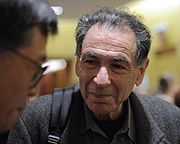
Paul Forman
Encyclopedia

National Museum of American History
The National Museum of American History: Kenneth E. Behring Center collects, preserves and displays the heritage of the United States in the areas of social, political, cultural, scientific and military history. Among the items on display are the original Star-Spangled Banner and Archie Bunker's...
. Forman's primary research focus has been the history of physics
History of physics
As forms of science historically developed out of philosophy, physics was originally referred to as natural philosophy, a term describing a field of study concerned with "the workings of nature".-Early history:...
, in which he has helped pioneer the application of cultural history
Cultural history
The term cultural history refers both to an academic discipline and to its subject matter.Cultural history, as a discipline, at least in its common definition since the 1970s, often combines the approaches of anthropology and history to look at popular cultural traditions and cultural...
to scientific developments.
Forman is especially known for two controversial historical theses. The first (often called "the Forman thesis") regards the influence of German culture on early interpretations of quantum mechanics
Quantum mechanics
Quantum mechanics, also known as quantum physics or quantum theory, is a branch of physics providing a mathematical description of much of the dual particle-like and wave-like behavior and interactions of energy and matter. It departs from classical mechanics primarily at the atomic and subatomic...
; Forman argued that the culture of Weimar Germany
Weimar culture
Weimar culture was a flourishing of the arts and sciences that happened during the Weimar Republic...
, through its emphasis on acausality, individuality and visualizability (Anschaulichkeit), contributed to the acceptance and interpretation of quantum mechanics. Forman's second thesis regards the influence of military funding on the character and course of scientific research; he argued that during World War II
World War II
World War II, or the Second World War , was a global conflict lasting from 1939 to 1945, involving most of the world's nations—including all of the great powers—eventually forming two opposing military alliances: the Allies and the Axis...
and the Cold War
Cold War
The Cold War was the continuing state from roughly 1946 to 1991 of political conflict, military tension, proxy wars, and economic competition between the Communist World—primarily the Soviet Union and its satellite states and allies—and the powers of the Western world, primarily the United States...
, the massive scale of defense-related funding prompted a shift in physics from basic to applied research, spurring considerable historical research on the effects of the military funding of science
Military funding of science
The military funding of science has had a powerful transformative effect on the practice and products of scientific research since the early 20th century...
. Forman's recent work focuses on "characterization of the modern/postmodern transition in science, society, and culture."
Forman thesis
Forman (1971) argued the remarkable scientific achievements in quantum physics in Weimar Germany in the 1920s involved the cross-product of the hostile intellectual atmosphere whereby many scientists rejected Weimar Germany as an illegitimate state and in which there were intellectual revolts against causality, determinism and materialism. The scientists adjusted to the intellectual environment by dropping Newtonian causality from quantum mechanics, thereby opening up an entirely new and highly successful approach to physics. Forman links the emergence of quantum mechanics, and Bohr's Copenhagen theory in particular, to the postwar revolt against rationalist and causal-realist philosophies of science. Many intellectuals felt those philosophies somehow contributed to the crisis of European (more specifically German) national identity. Forman concludes that:- "If the physicist were to improve his public image he had first and foremost to dispense with causality, with rigorous determinism, that most universally abhorred feature of the physical world picture. And this, of course, turned out to be precisely what was required for the solution of those problems in atomic physics which were then at the focus of the physicist’s interest."
The "Forman Thesis" has generated an intense debate for and against among historians of science. In support of Forman, Max Jammer and others cite anti-rationalist movements such as existentialism, pragmatism, and logical empiricism as showing a post-war cultural climate that was receptive to the kinds of argument advanced by Bohr, Heisenberg, Dirac and others. Just as many scholars have challenged the Forman thesis.

